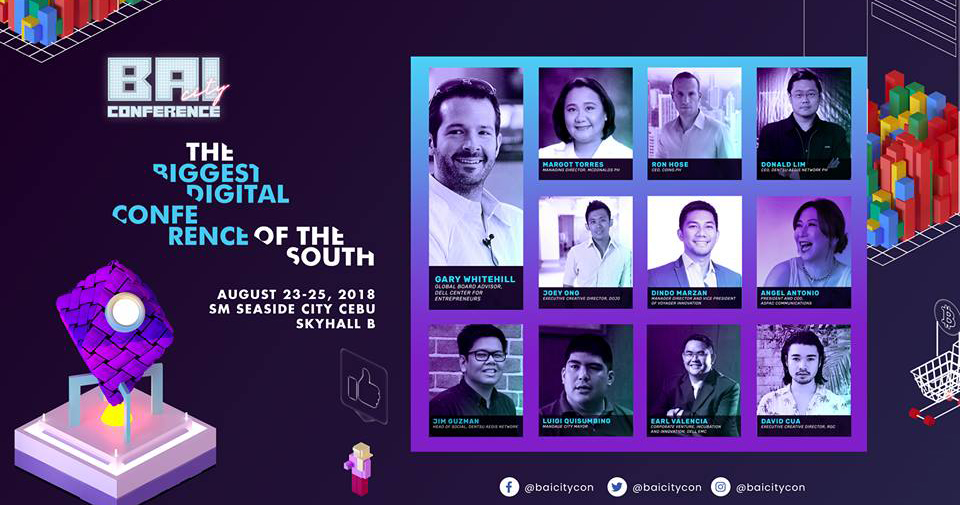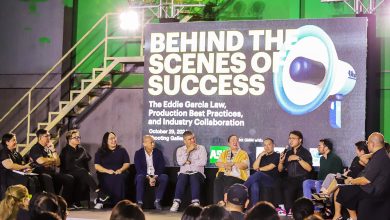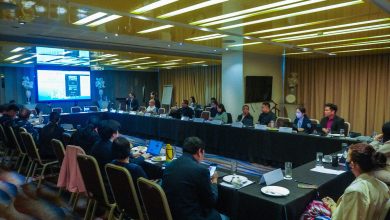CEBU CITY – Digital transformation has been on the rise worldwide and failure to adapt to this trend might greatly affect your business. In Cebu, most businesses are slowly understanding this, according to digital transformation agency Republiq Group of Companies (RGC).
But even today, there’s a bit of hesitation when talking to clients about digital. It is exactly this concern that prompted RGC to organize Bai City Conference (BCC) which aims to focus on educating businesses about the digital industry. Targeted at the businesses sectors in Visayas and Mindanao, the three-day conference is a push to convince everyone to consider and shift to digital.
In line with celebrating Digital Month this August, BCC’s Day 1 of the conference started on the 24th of August at the SM Seaside City Cebu. The conference featured a roster of international and local speakers who are experts in their fields and in the industry.
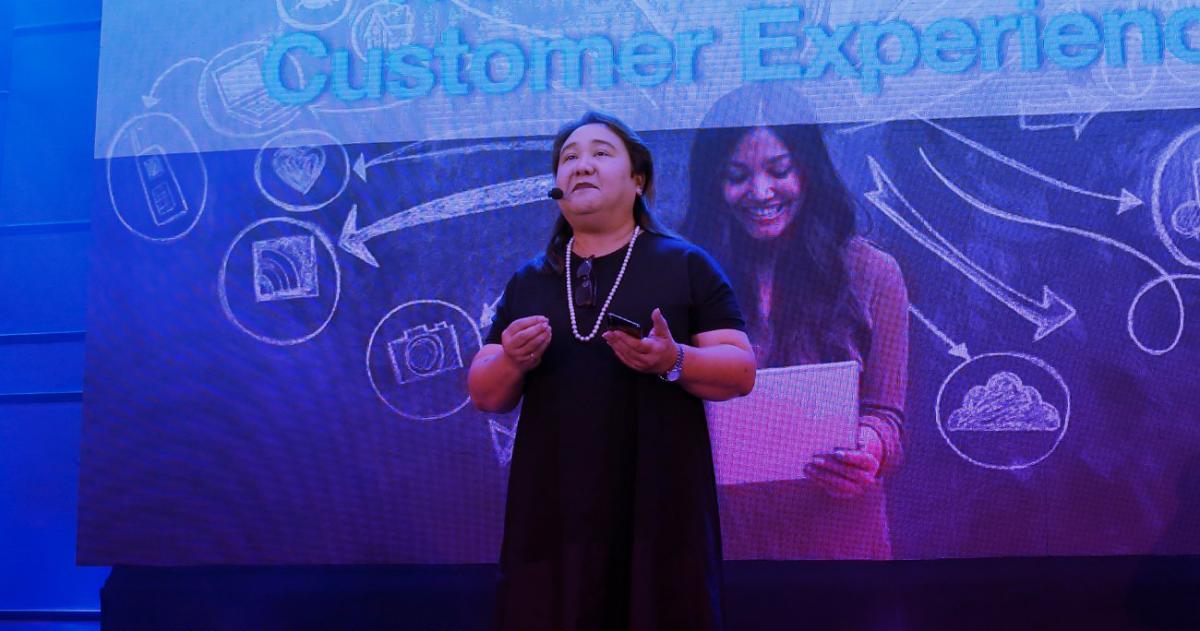 IN PHOTO: Margot Torres kick started BAI City Conference with her talk about Customer Experience.
IN PHOTO: Margot Torres kick started BAI City Conference with her talk about Customer Experience.
Margot Torres (Managing Director of McDonald’s Philippines) kick started Day 1 with her talk about Customer Experience. “We all know that this digital landscape has empowered the consumer and they’re able, therefore, to communicate not just with each other but also with institutions and brands,” said Torres. She noted that brands need to be ‘agile’ when it comes to attending their customers’ needs by not just responding but also listening.
Be it customer service, product quality or just the way the customers feel about the companies they do business with, customer experience rises to the top of whether or not the customer will decide to keep doing business with a brand.
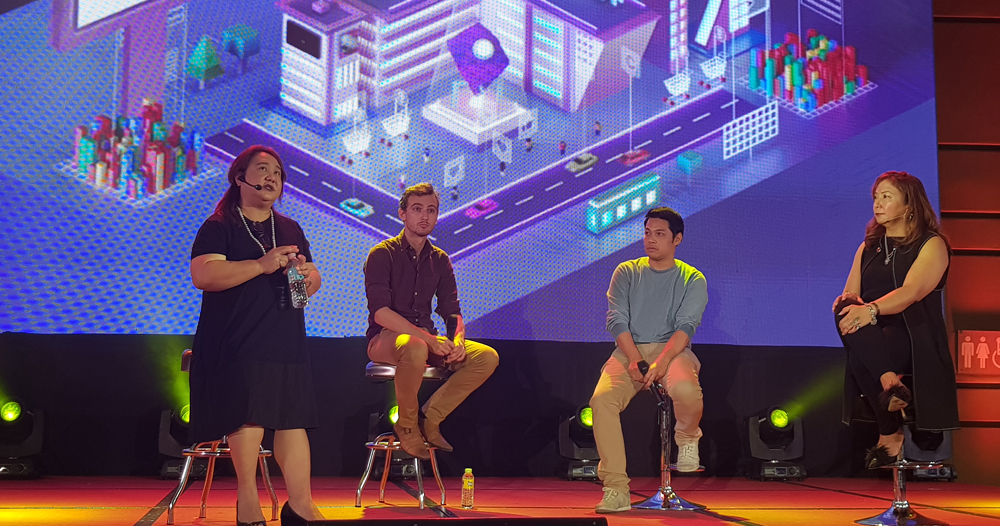 IN PHOTO (L-R): Margot Torres, Maxime Hulot, Jako De Leon and Angel Antonio.
IN PHOTO (L-R): Margot Torres, Maxime Hulot, Jako De Leon and Angel Antonio.
Torres further talked about this during the panel discussion moderated by Angel Antonio (President and COO of ASPAC), with members Maxime Hulot (Senior Account Executive of Digimind), and Jako De Leon (Social Media Influencer). The discussion focused on how digital changed our ads today.
“I think one of the first things that digital has been able to accomplish is that it changed brand approach. I think it’s authentic, it’s a two-way conversation, and there’s a need to listen to people and when you have that, you are creating a conversation and that creates something intimate,” shared De Leon.
Whatever your social media voice develops into, make sure it’s authentic to your brand. Trying to sound a certain way just to fit in can backfire. “The problem with social media now is there’s too much talking and not enough listening. When you have conversation, then you can open up a discourse between the consumers, the creators, and the brand,” De Leon said.
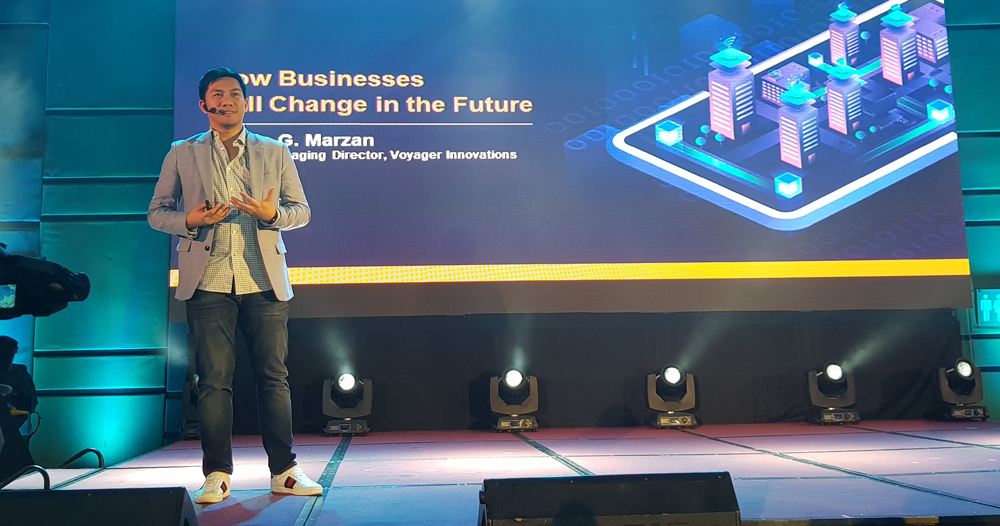 IN PHOTO: Dindo Marzan on how businesses will change in the future.
IN PHOTO: Dindo Marzan on how businesses will change in the future.
Dindo Marzan (Managing Director and Vice President of Voyager Innovations) also gave an insightful talk on how businesses will change in the future. “The thing is that technology has to be driven by the customer experience or the customer, not the other way around. You don’t use technology for technology’s sake. If the customer requires you to use these technologies to reach them, so be it,” said Marzan. “The mindset here is basically making sure that when you use technology, you are thinking of making your business efficient, effective and informative.”
Whether it’s having your coworkers and employees available via text/video chat at a moment’s notice, or being able to send targeted promotional email blasts to prequalified customers when they’re shopping at nearby businesses, the rise of mobile technology has blended almost seamlessly with communication software to create a hyper-real web of real time information. The exponential rate at which technology is developing, mutating, and adapting is so fast that you can’t help but be swept away in a tidal wave of progress—whether you’re ready for it or not.
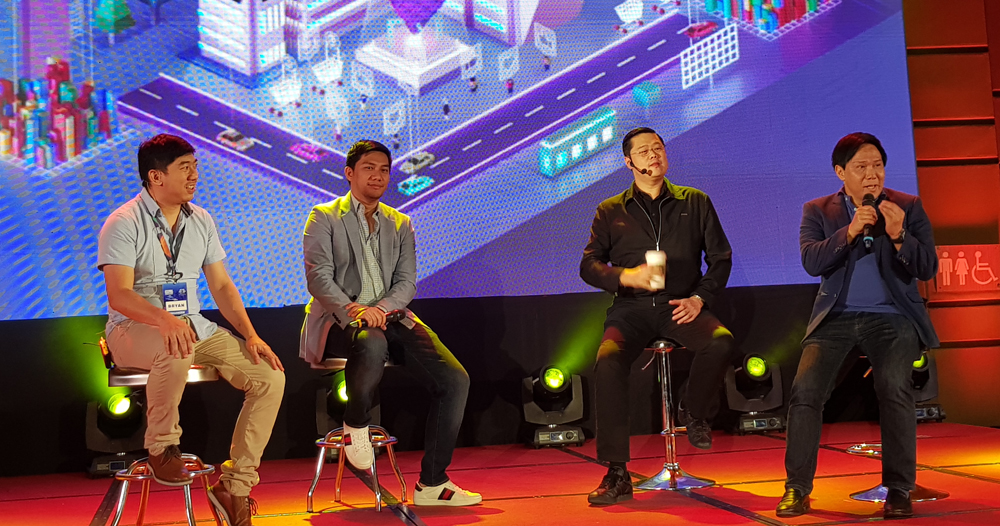 IN PHOTO (L-R): Bryan Yap, Dindo Marzan, Donald Lim and Diego Ramos.
IN PHOTO (L-R): Bryan Yap, Dindo Marzan, Donald Lim and Diego Ramos.
The second panel discussion of the day focused more on how digital transformation will change the business landscape. Moderated by Diego Ramos, the panel included Donald Lim (CEO of Dentsu Aegis Network PH), Dindo Marzan (Managing Director and Vice President of Voyager Innovations), and Bryan Yap (CEO of RGC).
The panel discussion tackled on how digital technology changes at an incredibly fast pace; often overnight. Relentless in its pace, these changes require employees across departments to be agile, work collaboratively and most importantly keep up to date with development so they have the skills to adapt and use these changes to the company’s advantage.
Continuing education provided as and when employees need it is a great way to achieve this. By upskilling a workforce in the latest and most relevant technologies, strategies and techniques, employees can be proactive in knowing what is coming down the line and understand how their brand can use these changes to their advantage.
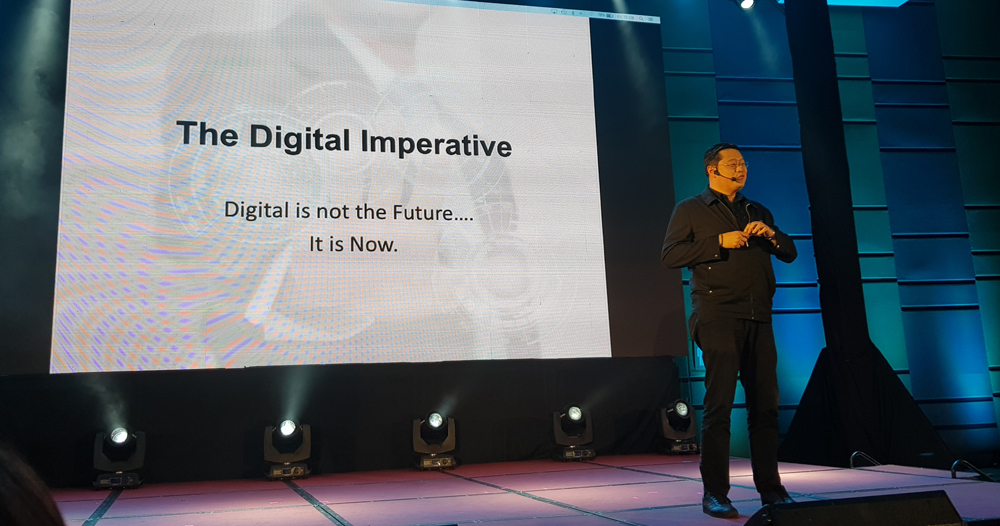 IN PHOTO: Donald Lim on how digital isn’t ‘future’ but ‘now.’
IN PHOTO: Donald Lim on how digital isn’t ‘future’ but ‘now.’
Donald Lim (CEO of Dentsu Aegis Network PH) went on to discuss how digital isn’t ‘future’ but ‘now.’ When businesses and the way they operate shift from their traditional mode of operation and management to the modern and technology-oriented ways of operation, the transitions referred to as Digital Transformation or disruption.
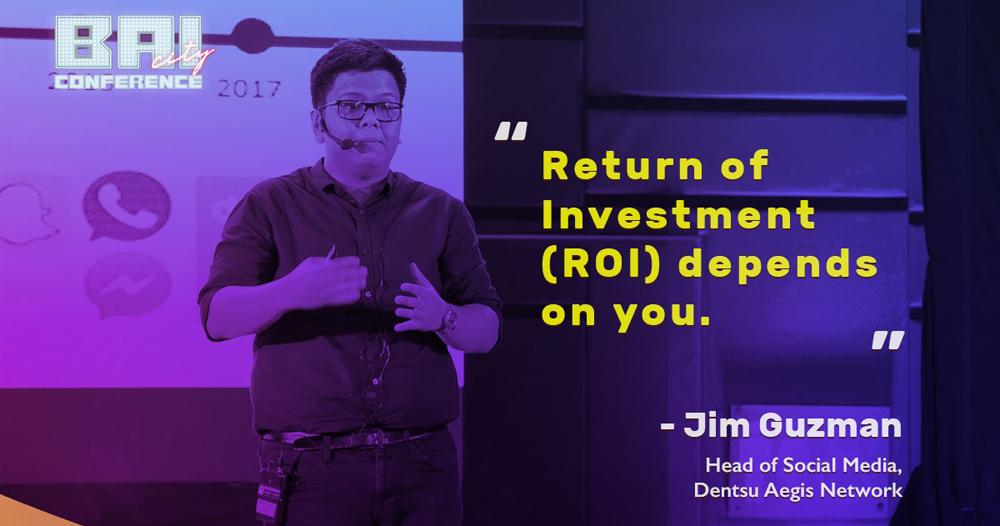
Meanwhile, Jim Guzman (Head of Social at Dentsu Aegis Network PH) talked about social media return on investment (ROI). Social media ROI boils down to how much you’re currently spending and how much your social media impact matters to your business right now. This can pose some difficult questions and decisions.
For Guzman, one thing you should also keep in mind is that social media gives intangible benefits, too, like brand building. Or even earning natural backlinks from people who find your site through a Tweet, and deciding to link to it on their own site. That might not add up to a measurable monetary value, but it’s definitely something that you have to factor in when determining whether social media marketing is helping your company.
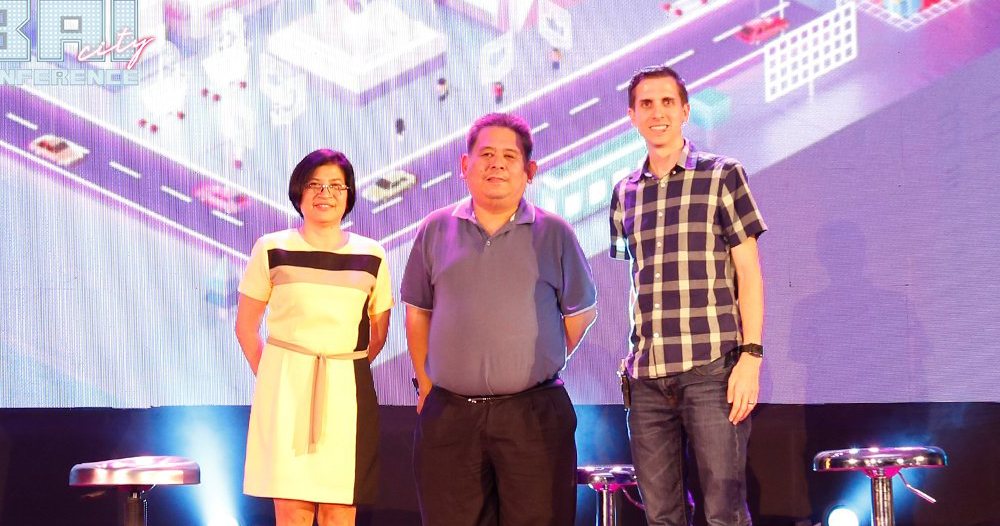 IN PHOTO (L-R): Ganzo Sederiosa, Rik Amores and Dave Overton.
IN PHOTO (L-R): Ganzo Sederiosa, Rik Amores and Dave Overton.
The last panel discussion of the day was with Dave Overton (Found and CEO of Symph), Ganzo Sederiosa (Consultant for Cebu Business and Economic Development) and Rik Amores (Assistant Regional Director of DICT-Region 7). The discussion was centered on how the government is supporting digital transformation.
It is now imperative that businesses and the government should embrace the digital economy and leverage the use of existing technologies. With the implementation of digital transformation in the marketplace, it is foreseen that more businesses will be able to access global trade opportunities and eventually participate in cross-border export transactions, addressing the issue of internationalization using the Internet.


